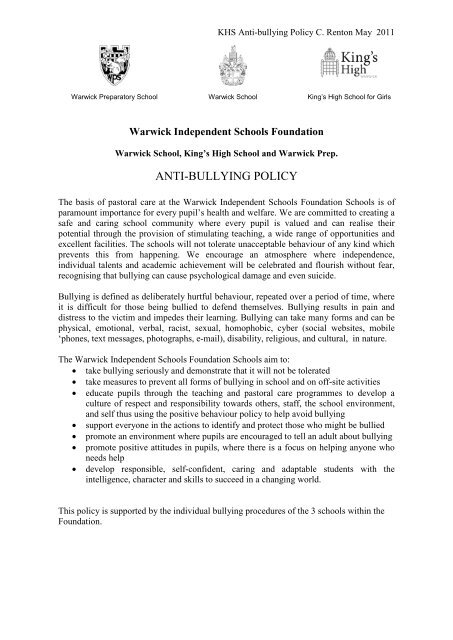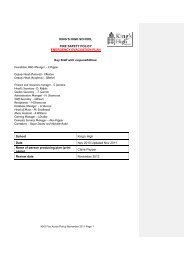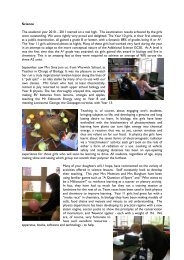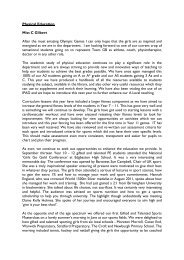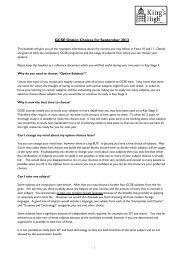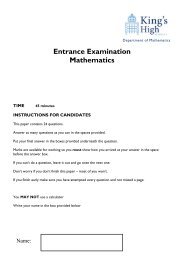ANTI-BULLYING POLICY - King's High
ANTI-BULLYING POLICY - King's High
ANTI-BULLYING POLICY - King's High
Create successful ePaper yourself
Turn your PDF publications into a flip-book with our unique Google optimized e-Paper software.
KHS Anti-bullying Policy C. Renton May 2011<br />
Warwick Preparatory School Warwick School King’s <strong>High</strong> School for Girls<br />
Warwick Independent Schools Foundation<br />
Warwick School, King’s <strong>High</strong> School and Warwick Prep.<br />
<strong>ANTI</strong>-<strong>BULLYING</strong> <strong>POLICY</strong><br />
The basis of pastoral care at the Warwick Independent Schools Foundation Schools is of<br />
paramount importance for every pupil’s health and welfare. We are committed to creating a<br />
safe and caring school community where every pupil is valued and can realise their<br />
potential through the provision of stimulating teaching, a wide range of opportunities and<br />
excellent facilities. The schools will not tolerate unacceptable behaviour of any kind which<br />
prevents this from happening. We encourage an atmosphere where independence,<br />
individual talents and academic achievement will be celebrated and flourish without fear,<br />
recognising that bullying can cause psychological damage and even suicide.<br />
Bullying is defined as deliberately hurtful behaviour, repeated over a period of time, where<br />
it is difficult for those being bullied to defend themselves. Bullying results in pain and<br />
distress to the victim and impedes their learning. Bullying can take many forms and can be<br />
physical, emotional, verbal, racist, sexual, homophobic, cyber (social websites, mobile<br />
‘phones, text messages, photographs, e-mail), disability, religious, and cultural, in nature.<br />
The Warwick Independent Schools Foundation Schools aim to:<br />
• take bullying seriously and demonstrate that it will not be tolerated<br />
• take measures to prevent all forms of bullying in school and on off-site activities<br />
• educate pupils through the teaching and pastoral care programmes to develop a<br />
culture of respect and responsibility towards others, staff, the school environment,<br />
and self thus using the positive behaviour policy to help avoid bullying<br />
• support everyone in the actions to identify and protect those who might be bullied<br />
• promote an environment where pupils are encouraged to tell an adult about bullying<br />
• promote positive attitudes in pupils, where there is a focus on helping anyone who<br />
needs help<br />
• develop responsible, self-confident, caring and adaptable students with the<br />
intelligence, character and skills to succeed in a changing world.<br />
This policy is supported by the individual bullying procedures of the 3 schools within the<br />
Foundation.
KHS Anti-bullying Policy C. Renton May 2011<br />
Anti bullying policy<br />
In accordance with the aims of King’s <strong>High</strong> School and its behavioural policy, the basis of<br />
pastoral care at King’s <strong>High</strong> is that every pupil’s health and welfare is of paramount<br />
importance. We are committed to creating a school community where every individual is<br />
valued and can learn and develop in a secure and caring atmosphere. Actions such as<br />
bullying undermine this aim and will not be tolerated. If bullying does occur, all pupils<br />
should be able to tell, and know that incidents will be dealt with promptly and effectively.<br />
Anyone who knows that bullying is happening is expected to tell. The school also<br />
recognises that it must take note of bullying perpetrated outside of school which spills over<br />
into the school. The school will do what is reasonably practicable to help eliminate any<br />
such bullying.<br />
What Is Bullying?<br />
Bullying occurs when an individual or a group of people, set out to make a person<br />
miserable and unhappy. Bullying is the use of aggression with the intention of hurting<br />
another person and is done so repeatedly over a period of time. Bullying results in pain and<br />
distress to the victim.<br />
Types of bullying can be related to:<br />
• Race, religion or cultural<br />
• Special educational needs or disability - young people with an SEN or a disability<br />
are more at risk of bulling than their peers and School needs to eliminate any SEN<br />
or disability related harassment<br />
• Appearance or health conditions - where there is a health or visible medical<br />
condition such as eczema, or perceived physical limitations such as size or weight.<br />
• Sexual orientation - young people who are gay or lesbian (or perceived to be) face<br />
higher risk of bullying<br />
• Young carers or looked after children or specifically their home circumstances -<br />
may be vulnerable as they face many difficulties , risks of ill health, stress, tiredness<br />
as well as falling behind because of home demands on their work.<br />
• Sexist and sexual - both sexes may become victims of their own sex as well as those<br />
who are transgender, experiencing gender dysphoria or do not conform with their<br />
gender role.<br />
Bullying may be characterised as:<br />
• Emotional being unfriendly, excluding, tormenting (e.g. hiding books, making<br />
threatening gestures)<br />
• Physical pushing, kicking, hitting, punching or any use of violence<br />
• Race racial taunts, graffiti, gestures<br />
• Sexual unwanted physical contact or sexually abusive comments<br />
• Homophobic because of, or focussing on the issue of sexuality<br />
• Verbal name-calling, sarcasm, spreading rumours, teasing<br />
• Cyber All areas of internet ,such as email & internet chat room misuse<br />
Mobile threats by text messaging & calls<br />
Misuse of associated technology, i.e. camera &video facilities<br />
Why is it Important to Respond to Bullying?<br />
Bullying hurts. No one deserves to be a victim of bullying. Everybody has the right to be<br />
treated with respect. Pupils who are bullying need to learn different ways of behaving.
KHS Anti-bullying Policy C. Renton May 2011<br />
Schools have a responsibility to respond promptly and effectively to issues of bullying and<br />
to try and identify where there are patterns of bullying to aid the response.<br />
Aims of the Policy<br />
The school aims:<br />
• To take bullying seriously and show it will not be tolerated<br />
• To take measures to prevent all forms of bullying in school and on off-site school<br />
activities<br />
• To support everyone in the actions to identify and protect those who might be<br />
bullied<br />
• To demonstrate to all that the safety and happiness of pupils is enhanced by dealing<br />
positively with bullying<br />
• To promote an environment where it is not an offence to tell someone about<br />
bullying<br />
• To promote positive attitudes in pupils in respect of their relationships with others<br />
• To take action to reduce the risk of bullying at times and in places where it is most<br />
likely to occur<br />
Objectives of this Policy<br />
• All governors, teaching and non-teaching staff, pupils and parents should have an<br />
understanding of what bullying is.<br />
• All governors and teaching and non-teaching staff should know what the school<br />
policy is on bullying, and follow it (when bullying is reported).<br />
• All pupils and parents should know what the school policy is on bullying, and what<br />
they should do if bullying arises.<br />
• As a school we take bullying seriously. Pupils and parents should be assured that<br />
they will be supported when bullying is reported.<br />
• Bullying will not be tolerated.<br />
Signs and Symptoms<br />
A child may indicate by signs or behaviour that he or she is being bullied. Adults should be<br />
aware of these possible signs and that they should investigate if a child:<br />
• is frightened of walking to or from school<br />
• doesn't want to go on the school / public bus<br />
• begs to be driven to school, refuses to get out of the car<br />
• changes their usual routine<br />
• is unwilling to go to school (school phobic)<br />
• begins to truant<br />
• becomes withdrawn anxious, or lacking in confidence<br />
• starts stammering<br />
• attempts or threatens suicide or runs away<br />
• cries themselves to sleep at night or has nightmares<br />
• feels ill in the morning<br />
• begins to do poorly in school work<br />
• comes home with clothes torn or books damaged<br />
• has possessions which are damaged or " go missing"<br />
• asks for money or starts stealing money (to pay bully)
• has dinner or other monies continually "lost"<br />
• has unexplained cuts or bruises<br />
• comes home starving (money / lunch has been stolen)<br />
• becomes aggressive, disruptive or unreasonable<br />
• is bullying other children or siblings<br />
• stops eating<br />
• is frightened to say what's wrong<br />
• gives improbable excuses for any of the above<br />
• is afraid to use the internet or mobile phone<br />
• is nervous & jumpy when a cyber message is received<br />
KHS Anti-bullying Policy C. Renton May 2011<br />
These signs and behaviours could indicate many other problems, but bullying should be<br />
considered a possibility.<br />
Procedures<br />
Schools<br />
1. If bullying is seen or suspected by a member of staff, it may be dealt with initially<br />
and immediately by that member of staff. A note should always be made and the<br />
relevant senior teacher informed. If a racial element is involved, the Head/Deputy<br />
Head(Pastoral) needs to be informed immediately<br />
2. Where concern about bullying has been seen or reported, the incident(s) will be<br />
recorded and given to the Head of Key Stage, Deputy Head (Pastoral) and Head<br />
3. The Head of Key Stage/Deputy Head (Pastoral) will interview all the parties and<br />
make a record<br />
4. The Head of Key Stage/form teacher will determine with the Deputy Head<br />
(Pastoral)/Head the appropriate strategy and plan of action to combat the bullying<br />
5. The form teacher will oversee the implementation of the strategy<br />
6. Parents may be informed and will be asked to come in to a meeting to discuss the<br />
problem<br />
7. If necessary and appropriate, police will be consulted<br />
8. The bullying behaviour or threats of bullying must be investigated and the bullying<br />
stopped quickly<br />
9. An attempt will be made to help the bully (bullies) change their behaviour<br />
10. Form teachers will be kept informed and staff teaching the bullied pupil will be<br />
informed<br />
11. Punitive measures (spanning the full range of available sanctions including<br />
suspension and expulsion) may be used as appropriate and in consultation with all<br />
parties concerned<br />
Pupils<br />
If a pupil is being bullied they should tell anybody they trust such as form teacher, Head of<br />
Key Stage, Deputy Head (Pastoral), subject teacher or any other member of staff or family<br />
or friends.<br />
Pupils who have been bullied will be supported by:<br />
1. offering an immediate opportunity to discuss the experience with a form teacher or<br />
member of staff of their choice<br />
2. reassuring the pupil<br />
3. offering continuous support
KHS Anti-bullying Policy C. Renton May 2011<br />
4. restoring self-esteem and confidence<br />
Pupils who have bullied will be helped by:<br />
1. discussing what happened<br />
2. discovering why the pupil became involved<br />
3. establishing the wrong doing and need to change<br />
4. informing parents or guardians to help change the attitude and behaviour of the<br />
pupil<br />
Outcomes<br />
The following steps can be taken:<br />
• The bully (bullies) may be asked to genuinely apologise<br />
• Sanctions may be imposed such as detention and exclusion from certain areas of<br />
school.<br />
• An official warning may be given to cease offending<br />
• Suspension or even exclusion will be considered<br />
• If possible, the pupils will be reconciled<br />
• After the incident / incidents have been investigated and dealt with, each case will<br />
be monitored to ensure repeated bullying does not take place.<br />
Anti-bullying education in school<br />
The School employs a number of strategies to educate the girls about bullying:<br />
• The School’s policy is discussed with year 7 in the first few weeks of term by their<br />
Head of Key Stage<br />
• PSHE sessions in year 7 highlight the issues in the context of good behaviour and<br />
suggest appropriate ways of dealing with negative and unkind behaviour<br />
• Each form teacher in school makes girls aware of and talks through the “Need Help<br />
or Advice” notice found in each form room. A bullying wallet card is given out to<br />
all girls in school every Sept. with information on how to deal with bullying and<br />
useful contact numbers.<br />
• Form tutorial time is given over to discussing bullying issues as well as it being part<br />
of the PSHE curriculum<br />
• Assemblies are used to ensure that the school policy is reinforced at regular<br />
intervals<br />
• Anti-bullying issues are raised in subject areas through the curriculum including<br />
Drama, History, English etc.<br />
• Awareness may be raised in School Council<br />
• Supervision of all areas at break and lunch time by staff is a priority and there are<br />
quiet supervised areas (library) where girls can go.<br />
• External agencies sometimes provide talks through the PSHE curriculum<br />
Involvement of Parents<br />
Parents should know that the school will not tolerate bullying and takes a positive approach<br />
to educating pupils to combat it.<br />
Parents of pupils who are being bullied and parents of the bullies will be involved in the<br />
solution to the problem as appropriate by the Head of Key Stage in consultation with the<br />
Deputy Head (Pastoral)<br />
Parents will be informed of the policy and procedures and the possibility of permanent<br />
exclusion (i.e. expulsion) following gross acts of bullying.
KHS Anti-bullying Policy C. Renton May 2011<br />
Involvement of Pupils<br />
Pupils will have an input into the PSHE anti bullying programme and through other<br />
strategies e.g. form time and will be consulted on how it could be developed. Part of this<br />
programme will focus on how to cope with bullying.<br />
Monitoring, evaluation and review<br />
The school will review this policy annually and assess its implementation and<br />
effectiveness. The policy will be promoted and implemented throughout the school.<br />
Responsibilities<br />
The Head will:<br />
• ensure that all staff are trained and have an opportunity of discussing strategies and<br />
reviewing them<br />
• determine the strategies and procedures<br />
• discuss the development of the strategies with the SMT<br />
• ensure appropriate training is available<br />
• ensure that procedures are brought to the attention of staff, parents and pupils<br />
• report annually to the Governing body<br />
The Deputy Head (Pastoral) will:<br />
• be responsible for the day to day management of the policy and systems<br />
• ensure that positive strategies and procedures are in place to help both the bullied<br />
and the bullies<br />
• keep the Head informed of incidents<br />
• arrange relevant staff training<br />
• determine how best to involve parents in the solution of individual problems<br />
• support and advise all other staff in dealing with bullying incidents<br />
• make regular reports to the Head<br />
Heads of Key Stage will:<br />
• be responsible for ensuring that the school’s positive strategies are put into practice<br />
• know the school procedure and deal with incidents that are reported<br />
Form Teachers will:<br />
• be responsible for liaising with Heads of Key Stage over all incidents involving<br />
their pupils in their form<br />
• be involved in any agreed strategy to achieve a solution<br />
• take part in promoting the anti-bullying policy through the PHSE programme
KHS Anti-bullying Policy C. Renton May 2011<br />
All staff will:<br />
• know the policy and procedures<br />
• be observant and ask pupils what is happening to them<br />
• deal with incidents according to the policy<br />
• never let incidents go unreported, whether on or off site<br />
• participate in promoting the policy<br />
Governing Body<br />
The “nominated Child Protection Governor” will liaise with the Chairman of Governors,<br />
the Head and the Deputy Head (Pastoral) over all anti bullying strategies and individual<br />
cases where appropriate. The Governors will discuss, review and endorse agreed<br />
strategies on the initiative of the nominated Governor and in any case will discuss the<br />
Head’s annual report on the working of the policy.<br />
Policy Review date : May 2012 DH(P)<br />
Helpful Organisations and Contact Details:<br />
• Childline – 0800 1111<br />
• NSPCC Helpline – 0808 800 500<br />
• Parentline Plus - 0808 800 2222<br />
• KIDSCAPE Parents Helpline (Mon-Fri, 10-4) 0845 1 205 204<br />
• The Samaritans – 01789 298 866 or 08457 909 090<br />
• Cruse Bereavement Line – 0208 940 4818<br />
• Relate Teenage line – 01926 403340<br />
• http://www.bullying.co.uk;<br />
• http://www.kidscape.org.uk<br />
• http://www.There4me.com


